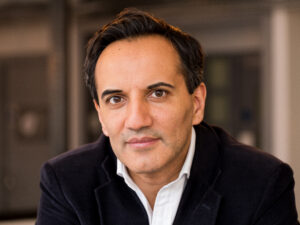Benefit from up-to-the-second, transparent climate risk on millions of assets, across the planet.
Iggy Bassi’s vision with Cervest to enable everyone to discover, quantify and share climate risk and machine learning methodologies providing granular, decision-ready insights that help decision-makers future-proof their assets against the impact of accelerating climate change.
What products or services do you provide?
Cervest delivers cloud-based Climate Intelligence (CI) on any asset, anywhere — giving enterprises, governments and financial service providers the most comprehensive view possible of climate risk at an asset level.
EarthScanTM (for enterprises and governments) and EarthCap (for financial service providers) fuse the latest peer-reviewed science and machine learning methodologies providing granular, decision-ready insights that help decision-makers future-proof their assets against the impact of accelerating climate change.
What type of businesses do you work with?
EarthScan’s early users are from a cross-section of industries, including real estate, manufacturing, retail and hospitality. Many have already experienced adverse climate events on their operations. Mitigation planning and reporting typically start with the ESG and risk management teams, who onboard other teams as the value of climate intelligence becomes clear for use cases in other areas, including supply chain management and acquisition planning. Accelerating climate events and the introduction of mandatory climate-related financial disclosure (already in effect in many countries and coming into effect in the UK from April 6, 2022) means every company will need to incorporate climate intelligence into their workflows to mitigate against potentially huge losses. In fact, a recent report by global analyst firm IDC, calls Climate Intelligence a “strategic priority for organisations worldwide”.
What problem does your company solve?
We are solving for the need to understand and future proof individuals, organisations and economies against the accelerating risk from climate change. Extreme events and new regulation means organisations are urgently seeking new insights and instruments to assess, plan for, report on and price their climate risk at an asset level. They need to translate climate risk complexity into easy-to-interpret, decision-useful insights that they can integrate into their risk management and reporting workflows, with clarity and confidence. Yet, most decision-makers have no idea where to start. Climate science is complex and there is no standardised approach to quantifying asset-level risk. Nine out of 10 decision-makers in a recent Cervest survey said their company had already seen at least one physical asset like an office or warehouse, affected by extreme weather in the past five years. In contrast, only half said they had factored climate change into their risk management planning.
What is your USP?
Cervest enables everyone to discover, quantify, and share climate risk on any asset, anywhere. We call it Climate Intelligence (CI). Cervest’s Climate Intelligence is uniquely built on peer-reviewed science, is quantifiable down to the asset level, and will be openly accessible for all. Our insights have been developed over the past five years by a team of experts who, among them, have over 250 peer-reviewed publications in the field.
Why CI? Because humans have, for too long, operated on the basis that nature is free, thinking it’s always going to serve us. But nature is biting back in big ways. The acceleration of climate change demands unprecedented decision-making clarity to strengthen our collective resilience and drive collaboration that will incentivise behaviour change at scale.
What are your company values? Have you ever had them challenged and if so how have you dealt with it?
Our company values are: objectivity, community, integrity, humility, curiosity, and beneficence. They’re underpinned by a framework of principles that guide what we do and how we do it: privacy, autonomy, impact-driven, responsibility, holistic approach, equity, sustainability, prudence, and transparency. Together, our values and principles ensure that accountability and ethical decision making are at the heart of the work we do.
How do you ensure that you recruit a team that reflects your company values?
It goes without saying that building and nurturing a diverse workforce is central to our success. The challenge we are tackling requires every skill set we can throw at it, and it is well known that more diverse teams are also more innovative. When it comes to values, we seek commonality and mission-alignment. We want team members that share our values and are passionate about working towards our common goal: to put climate at the core of every decision. That’s why, from our very first hires in 2016, our hiring process has included a values-alignment assessment. We have seen first-hand how interviewing for values alignment alongside fair and objective recruitment practices, delivers tangible business benefits, including higher completion and acceptance rates for candidates and, higher retention and productivity for employees.
Are you happy to offer a hybrid working model?
We have been operating remotely for over two years and have built a distributed team of extremely talented people across Europe and North America. We expect to continue this way of working as our business grows. A remote-first model ensures we have access to the best talent and is why we’ve been able to attract such a high level of science, engineering and commercial team members to Cervest. Over 60% of our team holds PhDs and Masters’s Degrees.
Do you have any tips for managing suppliers and customers effectively?
Work with mission-aligned suppliers. We aim to work with fellow B Corp-certified companies, for example, and those that share our vision to create a more resilient future for our planet. When you start from a place of shared values, developing a mutually productive relationship becomes a whole lot easier.
Being customer-focused means meeting customers ‘where they are’, not ‘where you think they are’ or ‘want them to be’. Climate Intelligence is a brand new decision-making superpower, and everyone is at a different stage of their learning journey. Our customers come to us because they have a job to do, or a problem to solve.
Any finance or cash-flow tips for new businesses starting out?
Understand the difference between profit and cash flow. In the words of Peter Drucker, “Entrepreneurs believe that profit is what matters most in a new enterprise. But profit is secondary. Cash flow matters most.”
Remember that cash flow is only one leg of the stool. I’m reminded of Jack Welch who said that if he “had to run a company on three measures, those measures would be customer satisfaction, employee satisfaction, and cash flow.”
Read more:
Secrets of Success: Iggy Bassi, Founder & CEO, Cervest














